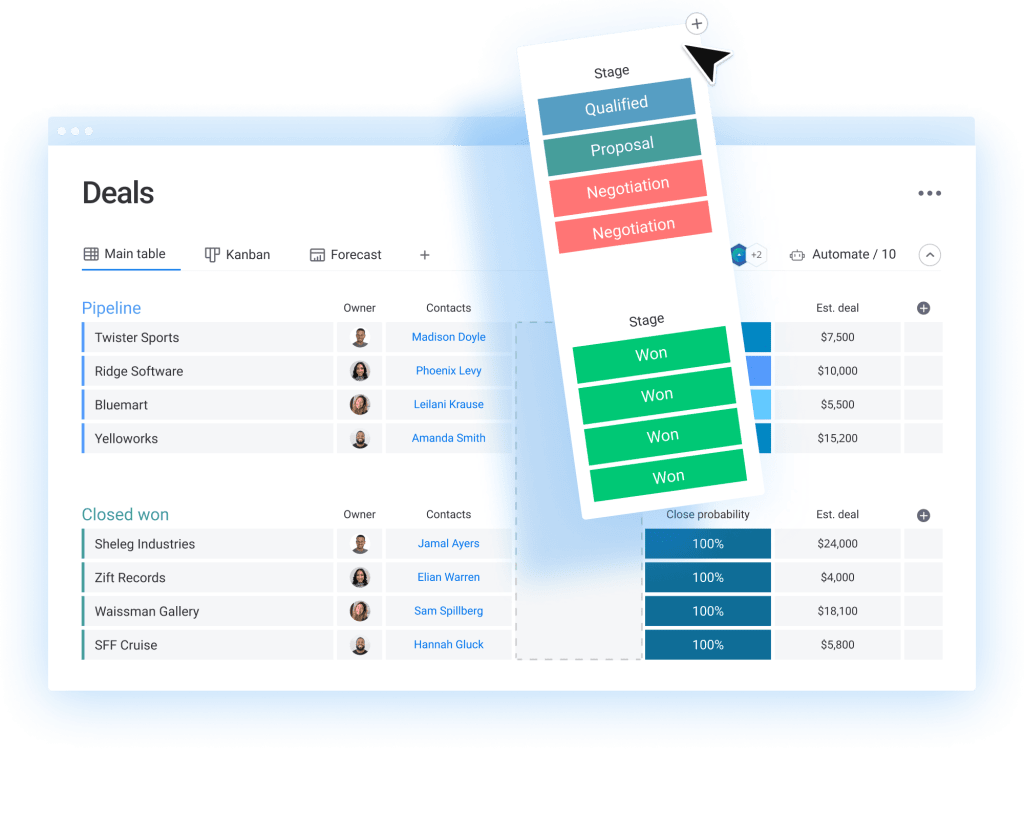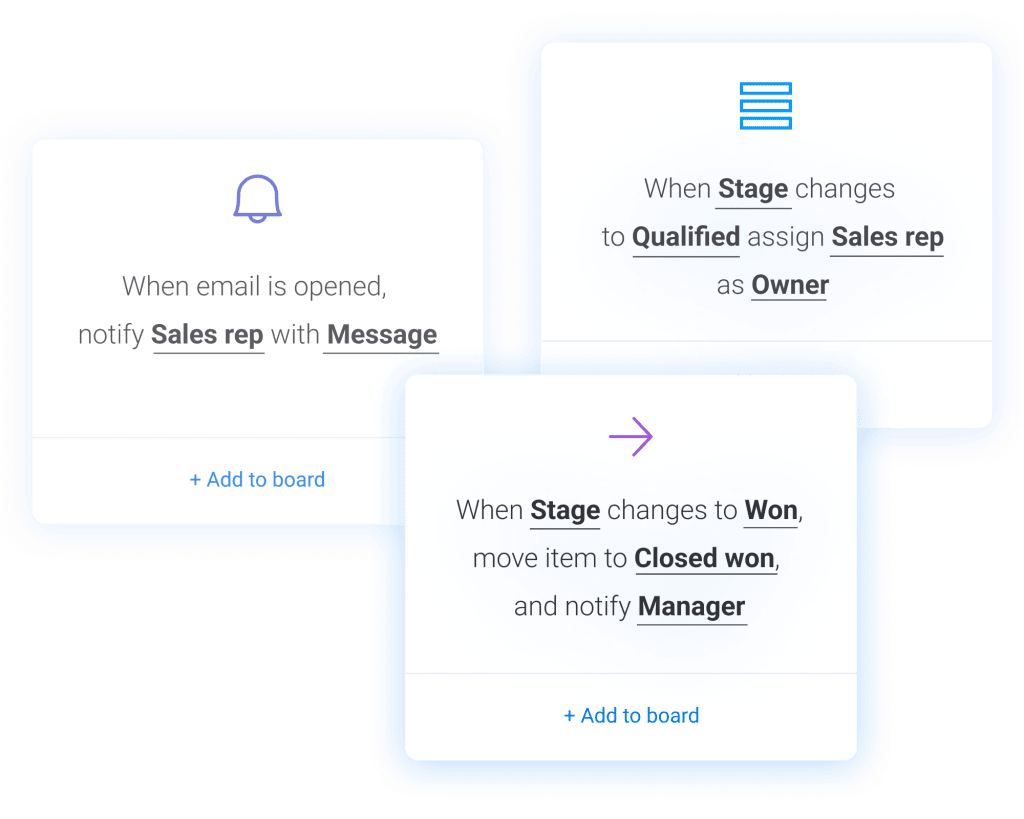The universal goal for salespeople is quite simple: to close a deal. Closing a sale is often accompanied by a buzz of excitement, added commission, and most importantly, a tangible contribution to the success of any business.
Butt when it comes to closing a sale, the stakes are high. Get it wrong and you may not have another chance.
The good news, however, is that there are ways to ensure you’re giving yourself the best chance to successfully close a deal. Sales closing is an art, and with the right tools, techniques, and practice, you can increase your close rate and seal more wins. In this guide, we’ll share the best sales closing techniques and show you how monday sales CRM can help you close more deals.
What is sales closing?
Sales closing is the final and most crucial step in the process of convincing a prospect to agree to a deal and make a purchase or sign a contract. It’s how sales professionals hit their targets and, ultimately, how businesses generate revenue.
Why is sales closing important?
After nurturing your lead, actively listening, overcoming objections, and negotiating, you reach the point where the prospect finally has to make a decision. But if you successfully complete the previous key milestones, sales closing should be a natural conclusion. So what are the best sales closing techniques to ensure you win the deal?
What are the nine most common sales closing techniques?
Of course, there’s more than one right way to close a sale. A lot comes down to your intuition and knowledge of the prospect and the situation. But it’s good to base the way you approach each sale on certain strategies. Here’s a list of proven methods that work effectively in different scenarios.
Assumptive close
The assumptive close requires a positive mindset. You assume from the beginning that you’ve won the deal – it’s just a case of asking how many items they want or when to start the implementation.
This technique requires the utmost confidence in yourself and your product or service. It’s ideal to use it as soon as you’ve highlighted the benefits of your offer so it’s still fresh in your prospect’s mind.
Puppy dog close
The puppy dog close is one of the most popular sales closing techniques. It’s based on the idea that if a pet store were to let you take a puppy home for a few days – just to try it – you’d be totally smitten and would not want to return it.
In real life, you could provide a free product trial with no obligation to buy. For example, offer a free 14-day trial of your software app, with no credit card required. It’s a proven winner!
Scale close
The scale close, also known as the gauge close, lets you test the interest level of your prospect.
For example, after you’ve finished your presentation, you might ask: “On a scale of one to 10, with one being ‘I’m not interested’ and 10 being ‘Let’s start next week,’ how likely are you to proceed?”
By asking an outright question and getting a straight answer, you can gauge their interest, overcome any objections, and ultimately close the deal.
Scarcity close
The scarcity close, also known as the now or never close, uses FOMO (fear of missing out) to get a prospect to buy now. For example, if they sign up immediately, you could offer an added benefit, like an extra day of consulting. You can use this technique to nudge your prospect over the line when they are genuinely interested in buying.
Question close
The question close technique lets you overcome any objections and get a commitment from your prospect throughout the sales process.
For example, you could ask: “Does what I’m offering solve your problem?” or “Is there any reason you can’t sign today?” The questions ask for closure or any reasons not to proceed. It’s a win-win.
Soft close
The soft close is less pushy. It offers a less rigid yes/no situation and gives prospects the impression that they are making their own decisions. For example, you could ask: “What do you think should happen next?” or “It seems like this is the perfect solution. What do you think?” You can use the soft close several times throughout the sales process to confirm you are getting buy-in from the prospect.
According to research for the Sales Strategy Playbook by Steve W. Martin, B2B buyers said that soft close techniques are more effective than hard closing statements.
Takeaway close
The takeaway close method uses reverse psychology. It works because it’s the opposite of what the prospect is expecting.
For example, you might say: “I appreciate all the time you’ve spent working this deal with me, but let’s take a step back, and you can contact me when you’re ready to move forward.” Or “It seems like we may not be a good fit?” Like the scarcity close, it’s perfect for getting the deal across the line when they’re genuinely interested. Since the prospect is frightened of losing out, they agree to close the deal.
Sharp angle close
You can use the sharp angle close technique to respond to a prospect’s request or demand and guarantee a deal. At some stage, a prospect will likely ask for a discount or an add-on. For example, they may say, “Could you add on an extra day of consulting?” or “Could you give us 10% off the first year?”
The ‘sharp angle reply’ might be: “If we can do that for you, can we close the deal today?” This forces the issue, and they’ll likely agree to the deal if the add-on is important. Remember to only use this technique if you have the authority to offer a discount or add-on.
Summary close
The summary close technique summarizes all the product features and how they will benefit your prospect, ending with a strong call to action. It’s a great way to wrap things up since it helps prospects visualize the deal, especially at the end of a long sales cycle when they may have forgotten something.
How monday.com can help you close more deals
According to the LinkedIn State of Sales Report, more than half (54%) of the survey respondents said that sales tools enable them to build stronger relationships and close more deals.
But it’s important to be able to customize your sales tools to tailor your team’s individual needs. The monday sales CRM is a customizable, easy-to-use software that arms sales teams with all the necessary tools to organize your leads in a way that makes sense for you. For example:
- Use our cutomizable interface to add as many columns as you like, categorize deal stages, and keep track of multiple pipelines simultaneously.

- Automate repetitive work to keep your team on track and save you time. For example, as soon as you log a deal as “Closed won,” you can create an automation to ensure your manager is automatically notified each time.

- Gain an instant overview of each deal with just a single click. This way you and ensure you have all the information needed to seal a deal in one easy-to-access place.
- Easily integrate our platform with the other sales tools you already use.
Frequently asked questions
Here are three of the most frequently asked questions about sales closing.
What is a good closing percentage in sales?
Research from Spotio revealed that best-in-class companies close 30% of their sales qualified leads (SQLs), while average companies only close 20%. But more astonishingly, 48% of sales calls end without an attempt to close the deal.
What is a good closing rate in sales?
A good closing rate depends on the industry and varies between inside and outside sales.
According to HubSpot:
- The biotech industry has an average sales close rate of 15%.
- The software industry has an average sales close rate of 22%.
- The finance industry has an average sales close rate of 19%.
- The average sales closing rate across all industries is 19%.
Figures from Zety show:
- The average closing rate for inside sales pros is 18%.
- The average closing rate for outside sales pros is 40%.
What is the biggest challenge to closing a sale?
The top 3 challenges to closing a deal are:
- Competing against a low-cost provider.
- Differentiating their product.
- Creating a compelling case for change.
Ensure you’re consistently closing sales with monday.com
Sales closing is the most crucial and celebrated step in the sales process. And for businesses, it’s the ultimate revenue-generating milestone. For 70% of sales reps, CRM systems play an essential role in closing deals. By making use of a customizable, easy-to-use, organized CRM system, you can feel confident that your sales team has the best chance for success.
Try the monday.com sales CRM and see for yourself how your sales team spends less time on repetitive administrative tasks and shifts their focus to closing more deals.

